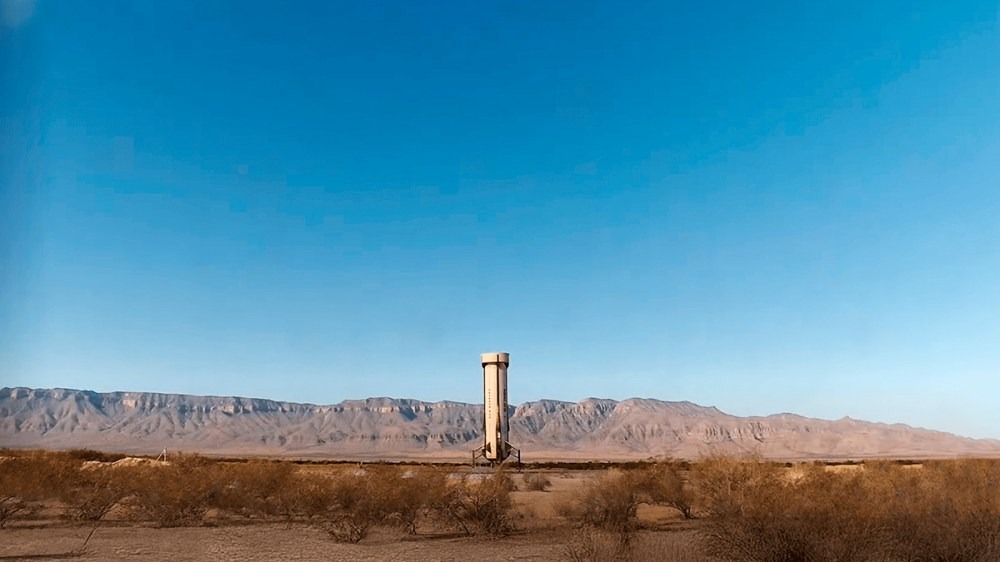Jeff Bezos’s Blue Origin is making significant strides toward offering suborbital space trips for civilians.
The aerospace company successfully launched its New Shepard flight NS-27 at 11:25 a.m. Wednesday in Texas. This mission marks the 27th flight in the program’s history and introduces its second human-rated vehicle. Named the RSS Kármán Line, this new crew capsule incorporates technological enhancements, including an increased flight capacity, which improves both its performance and reusability.
The New Shepard program, named in honor of American astronaut Alan Shepard, was established to take individuals on suborbital journeys high above the Earth. However, the recent flight did not carry any passengers. Instead, the vehicle transported five payloads on the booster and seven additional payloads inside the crew capsule. Notably, one of the payloads consisted of tens of thousands of postcards as part of an educational initiative organized by Blue Origin’s nonprofit organization, Club for the Future. This project collects postcards written by students, which are then launched into space on the commercial rocket and returned as keepsakes.
The launch window for NS-27 was initially scheduled for October 7, but it was postponed to address a technical issue. Another attempt was set for October 13, only to be delayed once more due to a GPS problem with the vehicle.
“We look forward to welcoming crew on board the RSS Kármán Line soon and providing the New Shepard flight experience to people worldwide from all backgrounds,” stated Phil Joyce, senior vice president of New Shepard. “On every New Shepard mission, we’ve seen how participants return to Earth transformed by the experience and with a renewed commitment to preserving our planet.”
Blue Origin’s latest space endeavor is part of a broader trend that has allowed the company to transport individuals on suborbital flights, catering to the increasing demand for space tourism. A standout moment in this journey occurred in 2021 when 93-year-old Emmy winner William Shatner, known for his role in Star Trek, flew with Blue Origin. Shatner, who made history as the oldest person to travel to space, was accompanied by three fellow crew members aboard the New Shepard rocket.
In addition to suborbital flights, Blue Origin is also in the process of developing a commercial space station, referred to as Orbital Reef. This innovative, solar-powered facility is being designed as a “mixed-use business park” that will orbit approximately 311 miles above the Earth. The goal is for Orbital Reef to be operational by 2030, provided all developments proceed as planned.
Blue Origin’s ambition extends beyond just transporting tourists into suborbital space. The company is actively working on advancements in technology and infrastructure that will pave the way for a new era of space exploration and commercial activity. The successful launch of the NS-27 flight is a testament to their commitment to this mission.
As the demand for space travel continues to grow, Blue Origin is poised to play a significant role in shaping the future of civilian spaceflight. The experiences offered through the New Shepard program aim to inspire a sense of wonder and responsibility towards the Earth. By providing access to suborbital flights, Blue Origin seeks to not only create memorable experiences but also foster a greater appreciation for our planet among those who embark on these journeys.
The NS-27 flight, despite not carrying passengers, serves an important purpose in Blue Origin’s ongoing efforts to ensure the safety and reliability of their vehicles. Each test flight contributes valuable data that enhances the overall design and performance of the New Shepard system.
Furthermore, the inclusion of educational payloads like the postcards demonstrates Blue Origin’s dedication to engaging younger generations in space exploration. By involving students in this unique project, the company not only promotes interest in STEM (science, technology, engineering, and mathematics) fields but also emphasizes the importance of environmental stewardship.
As Blue Origin continues to progress, the company remains focused on innovation and expanding the accessibility of space travel. With its ambitious plans for the future, including the development of Orbital Reef, Blue Origin is committed to pushing the boundaries of what is possible in the realm of aerospace and beyond.
In conclusion, the successful launch of New Shepard flight NS-27 marks another milestone for Blue Origin as it moves closer to making suborbital space travel a reality for civilians. With the introduction of the RSS Kármán Line and a series of innovative projects on the horizon, the company is poised to be a leader in the burgeoning space tourism industry. As they prepare to welcome passengers on board, the journey toward accessible space travel for all is gaining momentum.



